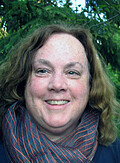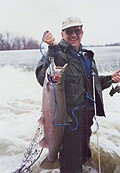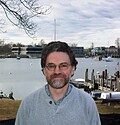This call is one in a series featuring the Boston University Superfund Research Program
The health benefits of fish have been well documented. However, fish are vulnerable to contamination from toxic chemicals, including mercury and polychlorinated biphenyls (PCBs). Superfund researchers examine ecological and human health risks of environmental contamination.
Recent trends of decreasing blood mercury levels in women of childbearing age, without a decrease in the amount of fish consumed, point to the importance of interventions to reduce contaminants in ecosystems, and education through public health initiatives. These include posted fish consumption advisories at water bodies, clinical guidance to patients, and widespread public outreach.
Speakers on this call included Dr. Mark Hahn, Boston University Superfund Research Program; Dr. Henry Anderson, University of Wisconsin and Wisconsin Department of Public Health; and Dr. Amy Kyle, University of California Berkeley Superfund Research Program. They addressed issues such as how fish become contaminated, how they are tested for contaminants, the ecological impacts of water contamination, and the science behind fish consumption advisories.
Featured Speakers
 Amy D Kyle, PhD MPH, is on the faculty in Environmental Health Sciences at the School of Public Health at the University of California, Berkeley and affiliated with the Superfund Research Program. She spent her formative years engaged in policy change to improve environmental quality and public health and retains an interest in public policy and building capacity of communities. Her work is at the intersection of science, policy, and civic engagement. She uses networking approaches to propagate knowledge and capacity for change across disciplinary and sectoral boundaries and is a leader in adapting scientific content for video and development of online learning resources. Her research addresses relationship between policy concepts and metrics based on empirical data, higher order approaches to synthesis of scientific research, and uptake of scientific findings and knowledge by civil society and public institutions. Recent areas of focus include cumulative impacts, chemicals policies, persistent and bioaccumulative chemicals, children’s environmental health, biomonitoring, and air pollution. She has served in senior positions in environmental protection at the state level. Her Masters of Public Health and doctorate in environmental health sciences and policy are from the University of California, Berkeley and BA in environmental sciences is from Harvard College. She has served as vice chair of the California Breast Cancer Research Council, Councilor to the Environment Section of the American Public Health Association, and on US EPA’s Children’s Health Protection Advisory Committee.
Amy D Kyle, PhD MPH, is on the faculty in Environmental Health Sciences at the School of Public Health at the University of California, Berkeley and affiliated with the Superfund Research Program. She spent her formative years engaged in policy change to improve environmental quality and public health and retains an interest in public policy and building capacity of communities. Her work is at the intersection of science, policy, and civic engagement. She uses networking approaches to propagate knowledge and capacity for change across disciplinary and sectoral boundaries and is a leader in adapting scientific content for video and development of online learning resources. Her research addresses relationship between policy concepts and metrics based on empirical data, higher order approaches to synthesis of scientific research, and uptake of scientific findings and knowledge by civil society and public institutions. Recent areas of focus include cumulative impacts, chemicals policies, persistent and bioaccumulative chemicals, children’s environmental health, biomonitoring, and air pollution. She has served in senior positions in environmental protection at the state level. Her Masters of Public Health and doctorate in environmental health sciences and policy are from the University of California, Berkeley and BA in environmental sciences is from Harvard College. She has served as vice chair of the California Breast Cancer Research Council, Councilor to the Environment Section of the American Public Health Association, and on US EPA’s Children’s Health Protection Advisory Committee.
 Henry A. Anderson, MD, received his MD degree from the University of Wisconsin Medical School in 1972. He is certified by the American Board of Preventive Medicine with a subspecialty in occupational and environmental medicine and is a fellow of the American College of Epidemiology. He is Chief Medical Officer and State Environmental and Occupational Disease Epidemiologist with the Wisconsin Department of Health and Family Services. He has adjunct professor appointments in Population Health in the Wisconsin School of Medicine and Public Health and the Gaylord Nelson Institute for Environmental Studies. Over the past 25 years he has conducted multiple research projects investigating human health hazards of consumption of Great Lakes and other sport fish and developed and evaluated the effectiveness of public health advisories. He is co-chair of the Great Lakes Fish Advisory Consortium.
Henry A. Anderson, MD, received his MD degree from the University of Wisconsin Medical School in 1972. He is certified by the American Board of Preventive Medicine with a subspecialty in occupational and environmental medicine and is a fellow of the American College of Epidemiology. He is Chief Medical Officer and State Environmental and Occupational Disease Epidemiologist with the Wisconsin Department of Health and Family Services. He has adjunct professor appointments in Population Health in the Wisconsin School of Medicine and Public Health and the Gaylord Nelson Institute for Environmental Studies. Over the past 25 years he has conducted multiple research projects investigating human health hazards of consumption of Great Lakes and other sport fish and developed and evaluated the effectiveness of public health advisories. He is co-chair of the Great Lakes Fish Advisory Consortium.
 Mark E. Hahn, PhD, is a Senior Scientist and Chair of the Biology Department at the Woods Hole Oceanographic Institution (WHOI) in Woods Hole, MA. He also serves as a project Principal Investigator in both the Boston University Superfund Research Program (BUSRP) and the Woods Hole Center for Oceans and Human Health (WHCOHH). Hahn received his PhD in Environmental Toxicology from the University of Rochester School of Medicine and Dentistry in Rochester, NY. He conducted postdoctoral research at WHOI before being appointed to the scientific staff in 1992. Dr. Hahn studies molecular mechanisms of toxicity following exposure to chemicals found in the marine environment as well as the molecular evolution of genes involved in those mechanisms. The focus of his BUSRP research is on mechanisms of adaptation and evolved resistance to chemicals in fish following long-term chemical exposure at Superfund sites. Dr. Hahn serves or has served on editorial boards of several journals and has served as Chair of the Joint Committee on Biological Oceanography of the WHOI/Massachusetts Institute of Technology (MIT) Joint Graduate Program in Oceanography and Oceanographic Engineering. Dr. Hahn is author or co-author of ~135 papers in peer-reviewed journals and books.
Mark E. Hahn, PhD, is a Senior Scientist and Chair of the Biology Department at the Woods Hole Oceanographic Institution (WHOI) in Woods Hole, MA. He also serves as a project Principal Investigator in both the Boston University Superfund Research Program (BUSRP) and the Woods Hole Center for Oceans and Human Health (WHCOHH). Hahn received his PhD in Environmental Toxicology from the University of Rochester School of Medicine and Dentistry in Rochester, NY. He conducted postdoctoral research at WHOI before being appointed to the scientific staff in 1992. Dr. Hahn studies molecular mechanisms of toxicity following exposure to chemicals found in the marine environment as well as the molecular evolution of genes involved in those mechanisms. The focus of his BUSRP research is on mechanisms of adaptation and evolved resistance to chemicals in fish following long-term chemical exposure at Superfund sites. Dr. Hahn serves or has served on editorial boards of several journals and has served as Chair of the Joint Committee on Biological Oceanography of the WHOI/Massachusetts Institute of Technology (MIT) Joint Graduate Program in Oceanography and Oceanographic Engineering. Dr. Hahn is author or co-author of ~135 papers in peer-reviewed journals and books.
This call was moderated by Madeleine Scammell, DSc, Assistant Professor, Environmental Health, Boston University School of Public Health. The call lasted for one hour and was recorded for archival purposes.
